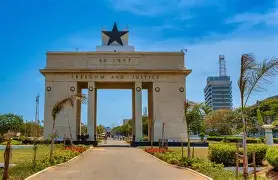
Ghana’s development dilemma: The rise of academia or a third political force
Ghana’s legal and constitutional framework supports a multi-party democracy. However, since the establishment of the 1992 constitution, it has been considered a de facto two-party state.
The two main political parties, the National Democratic Congress (NDC) and the New Patriotic Party (NPP), have dominated Ghana’s political landscape in both parliament and the presidency, taking turns in power and leaving smaller parties with little chance.
This raises the question of whether smaller parties play a significant role in Ghana’s body politic, as the two major parties are the only ones with a credible chance of winning a national election and forming a government, barring any unforeseen changes.
Since the country’s return to constitutional democracy, it has yet to experience significant improvement in governance, the economy, justice, employment, and the elimination of corruption.
Public trust in government institutions is not at its best. The individuals employed to make these institutions practical and functional according to the constitution have essentially become a law unto themselves, ignoring the rules meant to guide their work, thereby weakening these institutions (weak institutional framework).
Many Ghanaians, myself included, have wondered whether achieving industrialisation, adopting a science-based approach to life, pursuing innovation, and acquiring technological knowledge to advance our civilisation and support human flourishing is truly attainable.
It is a widely shared belief that a third force, a robust third political party, could introduce healthy political competition to Ghana’s body politic, potentially leading to the social and economic development we aspire to.
However, upon careful reflection, considering our cultural politics, such as the entrenched NPP or NDC identity, and the persistent influence of ethnic politics, we see a dynamic leaning more toward failure than success. I doubt whether a third political party can fundamentally and positively shake our political foundation because politics is downstream from culture.
The third force I envisage is the rise of Ghanaian academia. Throughout history, from ancient to modern civilisations, intellectuals have been the catalysts and shapers of human progress, evident in ancient Mesopotamian, Egyptian, Greek, Persian, Roman, and modern Western civilisations.
These civilisations have demonstrated that intellectuals are the centre where human potential is brought to bear in an endless horizon. Intellectuals generally are masters in their own right, capable of providing an unbiased philosophical basis for political and social reforms.
Ghanaian intellectuals will be capable of bringing about the positive change we desire as a nation in the political, social, and economic spheres, provided that, within the academic domain, they place more emphasis on science and technology rather than fruitless ideologies.
Political and ideological pundits have dominated the intellectual landscape for too long, promoting certain opinions and ideas that harm our ongoing efforts to build a better nation, driven more by personal benefit than national interest.
While intellectualism is often a force for social good, it can also be a force for evil when unchecked. Charles Darwin was a biologist who developed the theory of evolution through natural selection.
The philosopher and sociologist Herbert Spencer later misapplied and popularised this concept as Social Darwinism. He coined the term “survival of the fittest” in 1864 in his work The Principles of Biology after reading Darwin’s Origin of Species.
This term was subsequently used by Western Europeans to justify racial superiority over other groups—the strongest and fittest (Europeans) would succeed, while other races, considered unfit, would fail.
Modern science, however, concludes that this notion of racial superiority has no basis in biology; it is a social construct.
This is what Professor Thomas Sowell says about intellectuals: “It is people in a particular occupation—namely, people whose work begins and ends with ideas. It is an occupational designation, rather than an honorific title, and implies nothing about the mental level of those in that occupation. Chemists or chess grandmasters may be of equal or greater mental accomplishment, but they are not intellectuals because their work ends with an outcome subject to empirical verification by known standards, while the outcomes of the work of intellectuals are subject essentially to peer consensus.”
Ghanaian intellectuals must become a personification of moral force that guides our nation to harness its potential to create and support our civilisation.
They should stand as a symbol of impartiality, irrespective of religious or political affiliation, and hold every ideological belief and internal cultural value to the litmus test of objective reality.
They should be able to question unproductive social and political systems, provide better alternative ideas that reflect concrete reasoning, and shape a generation’s minds to usher in Ghanaian industrialisation.
When we leave our national development solely in the hands of politicians and laypersons, our efforts will be futile, moving like a rollercoaster.
We can decide to change our laws each year, but if we don’t learn to work with the laws, we are also going nowhere. Intellectualism is vital to national development and thrives on substantial financial investment.
If we fail to invest in intellectualism, we are planning to fail. Like many other African countries, Ghana fails to allocate 1% of its Gross Domestic Product (GDP) to Research and Development (R&D), as recommended by the African Union.
Countries such as Switzerland, the U.S.A., South Korea, Israel, and China, and many other developed nations, recognize that intellectualism brings about national development and make substantial and strategic investments with the help of the private sector.
For instance, the Swiss allocate 3.4% of their GDP to this area, and the Swiss Parliament has approved a total of CHF 29.2 billion for the 2025–2029 funding period in the field of intellectualism. This underscores the urgency and necessity of investing in intellectualism for our nation’s future.
The Swiss are reaping enormous benefits from this investment; the country has been ranked the world’s most innovative economy for 15 consecutive years.
It has a high global ranking in medicine, defense production, and top-notch scientific research, and its innovative human resources are sought after by big tech firms across developed nations.
Swiss universities have attracted many of the best intellectuals because they offer good incentives, similar to most universities in Western civilisation and the Near East.
This is not a new phenomenon; it occurred in ancient civilisations as well, though in a slightly different manner. When a city was conquered, its strong and intellectual individuals were often captured and helped build their captor’s cities, advancing their scientific knowledge in the ancient world.
Only our Ghanaian intellectuals know how to make our nation; the private sector and the government must realize the importance of investment in this field.
DISCLAIMER: The Views, Comments, Opinions, Contributions and Statements made by Readers and Contributors on this platform do not necessarily represent the views or policy of Multimedia Group Limited.
DISCLAIMER: The Views, Comments, Opinions, Contributions and Statements made by Readers and Contributors on this platform do not necessarily represent the views or policy of Multimedia Group Limited.








